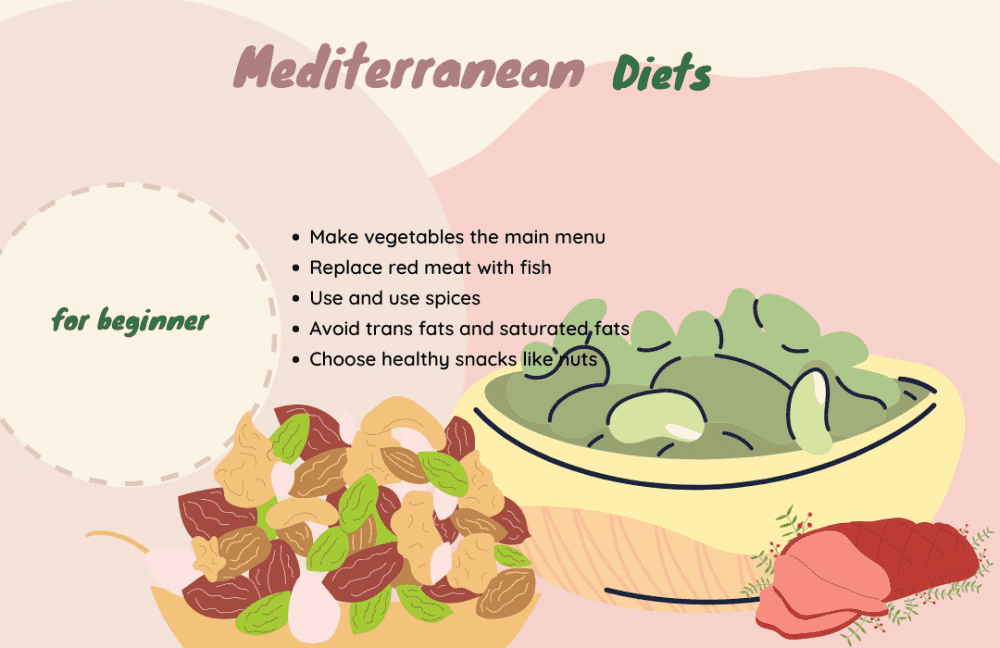Did you know that the Mediterranean diets weight loss program can help seniors live up to 8 years longer? Americans live shorter lives than people living in other countries with higher incomes, so it is not surprising that making lifestyle changes would be beneficial.
Are you looking for a healthy and balanced diet that can help you achieve optimal health and well-being? If so, you might want to consider the Mediterranean diet. The Mediterranean diet is a popular dietary pattern that emphasizes whole, minimally processed foods and healthy fats, such as olive oil, nuts, and fish. It is also rich in fruits, vegetables, whole grains, and legumes. In this article, we will explore the Mediterranean diet and its health benefits in detail.
Let’s get in-depth and learn more about the many benefits of Mediterranean eating.
What is the Mediterranean diet?
The Mediterranean diet is a dietary pattern inspired by the traditional cuisines of countries surrounding the Mediterranean Sea, including Italy, Greece, Spain, and Morocco. It is characterized by high consumption of fruits, vegetables, legumes, whole grains, nuts, seeds, and healthy fats, such as olive oil and fatty fish. Moderate consumption of dairy products, such as cheese and yogurt, and red wine is also allowed.
History of the Mediterranean Diets
The Mediterranean diet has been around for centuries, and its origins can be traced back to the traditional dietary habits of people living in the Mediterranean region. Its popularity as a healthy eating pattern gained momentum in the 1960s when researchers noticed that people living in the Mediterranean region had lower rates of heart disease, cancer, and other chronic illnesses compared to people in other parts of the world. Since then, numerous studies have been conducted to investigate the health benefits of the Mediterranean diet.
Components of the Mediterranean diet
The Mediterranean diet is a plant-based diet that emphasizes the consumption of fruits, vegetables, legumes, whole grains, nuts, and seeds. It also includes moderate consumption of fish and seafood, and low to moderate consumption of poultry and dairy products. Red meat, processed foods, and sugary beverages are limited to the Mediterranean diet.
Healthy fats are an important component of the Mediterranean diet. Olive oil is the primary source of fat, and it is used for cooking, dressing, and seasoning. Nuts and seeds are also excellent sources of healthy fats. Moderate consumption of red wine is also a part of the Mediterranean diet. Red wine is rich in antioxidants, which can help protect against heart disease and other chronic illnesses.
Foods Included in the Mediterranean Diets

The Mediterranean diet emphasizes whole, unprocessed foods such as fruits, vegetables, whole grains, legumes, nuts, and seeds. It also includes healthy fats such as olive oil, fatty fish, and avocados. Lean protein sources such as chicken and turkey are also included.
Mediterranean Diets Meal Plan
A typical Mediterranean diet meal plan includes a variety of fruits and vegetables, whole grains, legumes, nuts, and seeds. It also includes healthy fats such as olive oil, fatty fish, and avocados. Lean protein sources such as chicken and turkey are also included.
How to Get Started on the Mediterranean Diet
Getting started on the Mediterranean diet is easy. Start by incorporating more fruits, vegetables, whole grains, legumes, nuts, and seeds into your diet. Replace unhealthy fats such as butter and margarine with healthy fats such as olive oil. Choose lean protein sources such as chicken and turkey over red meat.
Foods to Eat on the Mediterranean Diet
The Mediterranean diet emphasizes the consumption of whole, minimally processed foods, such as:
- Fruits and vegetables: Berries, apples, oranges, spinach, kale, broccoli, tomatoes, cucumbers, etc.
- Whole grains: Brown rice, quinoa, bulgur, barley, whole-wheat bread, pasta, etc.
- Legumes: Lentils, chickpeas, black beans, kidney beans, etc.
- Nuts and seeds: Almonds, walnuts, pistachios, chia seeds, flaxseeds, etc.
- Fish and seafood: Salmon, trout, shrimp, clams, mussels, etc.
- Poultry: Chicken, turkey, etc.
- Dairy products: Greek yogurt, feta cheese, etc.
- Healthy fats: Olive oil, avocado oil, nuts, seeds, etc.
Foods to Avoid on the Mediterranean Diet
The Mediterranean diet limits the consumption of processed and red meat, as well as foods high in added sugars, saturated and trans fats, and refined grains, such as:
- Processed meat: Bacon, sausage, hot dogs, etc.
- Red meat: Beef, pork, lamb, etc.
- Sugary foods: Candy, soda, baked goods, etc.
- Saturated and trans fats: Butter, margarine, lard, etc.
What are the potential benefits of the Mediterranean diet? It can be difficult to change your eating habits, so make sure you can see the benefits to your health.
1. Reduce your risk of developing heart disease
The greatest benefit of the Mediterranean diet plan for fitness is its ability to lower the risk of developing a cardiovascular disorder.
This statement may be supported by the long life expectancy of Mediterraneans. This could be a huge benefit to those already suffering from cardiovascular disease or people who are already taking heart medication.
A healthy diet that is good for your heart and gut health is important at all ages, but it can be more crucial in your senior years.
2. This helps with weight loss
The Mediterranean diet for weight loss can be very beneficial because you will be eating lots of fruits, vegetables, nuts, and fish. You can lose weight by combining this with regular exercise.
You may also like Weight Loss Tracker Apps for easy tracking of your weight.
3. Protects against Cognitive Decline
Because of so many variables that influence life, it may prove difficult to assess the long-term effects of the Mediterranean diet plan.
This cuisine will also offer protection against cognitive decline. You may want to consider Mediterranean diet cuisine if you are concerned about your mental abilities.
This delicacy will not be lost on you if you have so many delicious weekly meals to choose from. Vidalista 80 and Vidalista 40 are now available as treatments for male erectile disorders.
4. May Lower the Risk of Stroke
As they age, many people worry about the possibility of suffering a stroke.
Research has shown that the Mediterranean weight-reduction program may be beneficial in reducing the risk of developing this illness. Perhaps now is the time to make changes to your nutrition to help prevent future diseases.
5. Wide Variety of Foods
One of the maxima dies does not mention that the Mediterranean diet benefits come down to taste. You can combine many delicious meals to create a complete meal.
This delicacy will not be lost on you if you have so many delicious weekly meals to choose from. Nizagara 100 and Super tadapox are now available as a treatment for male erectile disorder.
The Mediterranean Diets has Many Benefits
It is not a surprise that so many people continue to advocate the many blessings of the Mediterranean diet. It is possible to reduce the risk of getting struck by many intense conditions, even though it requires a shift in your food preparation and consumption. This wide range of ingredients will make it easy to transition to a healthier lifestyle. If you found this article useful, please visit our Health section to see more top-notch posts before you make your move.
Conclusion
In conclusion, the Mediterranean diet is not just a diet, it is a lifestyle. This dietary pattern has been proven to reduce the risk of several chronic diseases, promote weight loss, and improve overall health. By incorporating plenty of fruits, vegetables, whole grains, legumes, nuts, seeds, and olive oil, and limiting red meat, saturated fat, and processed foods, individuals can reap the benefits of this healthy way of eating.
It’s important to note that while the Mediterranean diet is a healthy choice, it’s not a one-size-fits-all approach. Each individual’s dietary needs and preferences may vary, and it’s essential to consult with a healthcare professional before making any significant changes to one’s diet.
Thank you for taking the time to read this article. We hope that you have gained valuable insights into the Mediterranean diet and its potential benefits. Your contribution helps us continue creating more valuable content.


